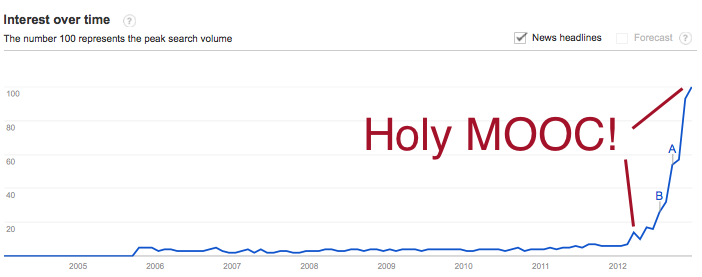MOOCS for professional development get significantly less attention than MOOCs as a disruptor of higher education. Nonetheless, professional development – both formally and informally – may be the area where the real opportunity lies. This article provides resources for learning business leaders who are interested in the potential of MOOCs for professional development.
Additional posts in this series include:
- Flipped Classroom for Continuing Education and Professional Development
- Microlearning for Professional Development and Continuing Education
Be sure also to check out our Leading Learning interview with Dr. Barbara Oakley, creator of the Coursera Learning How To Learn MOOC that has attracted more than 2 million learners.
Definition of MOOC
In its pure form, a MOOC, or Massive Open Online Course, is an online course, developed for participation by a large – or “massive” – audience and for which registration is completely open – meaning no fees are charged either directly (e.g., an enrollment fee) or indirectly (e.g., through requiring a membership fee to get access to course registration).
Perhaps the best know examples of MOOCs are those that have been developed through edX and Coursera – both of which grew out of partnerships with or among major universities internationally – or the commercial provider Udacity (which has more recently turned its focus to “nanodegrees“). While MOOCS do not have quite the buzz now that they did a few years ago, they continue to evolve and are likely to remain – in one form or another – an important part of the lifelong learning landscape.
MOOCs for Professional Development: Readings
I recommend reviewing the following resources for learning more about the history of MOOCs and how they function.
- 7 Things You Should Know About MOOCs
Although published in mid-2013, this brief PDF from Educause remains one of the better high-level introductions to MOOCs. - Surveying the MOOC Landscape
Research about MOOCs continues to accumulate. This article provides highlights from recent research from Harvard and MIT. The big headline is that, while MOOC enrollments are not accelerating at the pace they were in 2012 (dubbed “Year of the MOOC” by The New York Times), they are still growing, and the format seems to be evolving in distinct directions – one of which is serving the demand for continuing education. - Pedagogy Of MOOCs And Benefits For Modern Professionals
This brief post on eLearning Industry gives a nice summary of what MOOCs may be appealing to – and effective for – adults seeking continuing education and professional development. - The Strengths and Weaknesses of MOOCs
While written from a higher education viewpoint, this series by Tony Bates is still very useful for anyone looking at MOOCs for professional development and continuing education purposes. Indeed, Bates’ series is one of many resources that points to the significant value that MOOCs can have for continuing education. As a variety of research has shown, most users of MOOCs are older and already well credentialed. (Along those lines, see Demystifying the MOOC.) - Why Massive Open Online Courses Still Matter
This TED Talk from Anant Argawal, the head of edX, lays out some of the key arguments in favor of MOOCs. Perhaps more important for the purposes of this post, Argawal provides some visuals of how an edX course actually works. If you have never participated in a MOOC, these visuals provide some useful background.
MOOCs for Professional Development: Examples
Given that the major audience for this Web site is trade and professional associations, I want to be sure to highlight some association MOOC examples. However, I also wanted to mention at least one corporate example, as that may be where the biggest opportunity – at least in terms of revenue generation – lies for education businesses.
- A Big Course from a Small Association
- MOOC as Promotion: Brewers Association Launches Beer Course
- MOOCs in Continuing Education: Breaking Tradeoffs
- Coursera’s MOOCs Go To Work: What MasterCard Is Learning
MOOCs for Professional Development: Tech Tools
Arguably, the tools used for MOOCs are not much different from the ones that have traditionally been used for e-learning: most of the same general technologies for producing digital content, managing learners, and providing for community and collaboration still apply.
That said, my experience with the major MOOC platforms is that they are doing a good job creating a much better learner experience than has been the case with traditional LMSes. And one of the major platforms – edX – is available for open-source use:
Of course, harnessing open-source technology is usually not to be undertaken lightly. You may want to consider working with provider like IBL Studios that specializes in this area.
The usual open source LMS options – Moodle, for example – can also be platforms for MOOCs. The main advantage to the open-source route is that you don’t get saddled with the user and content fees that come with typical LMS licensing. If you are really going to hit “massive” numbers, these fees can shut you down pretty quickly. That said, if you have an established LMS relationship, it is worth going to the provider and pushing the issue: what can they do to help you take advantage of the MOOC wave without breaking the bank? The more forward-thinking providers should already have an answer to this question.
Jeff
P.S. – I came across this article after publishing the post above: How Organizations Can Reap the Benefits of MOOCs Faster. I think there is some good food for thought and discussion here about how MOOCs might be leveraged in delivering contract/customized training to corporate and institutional customers.


Leave a Reply